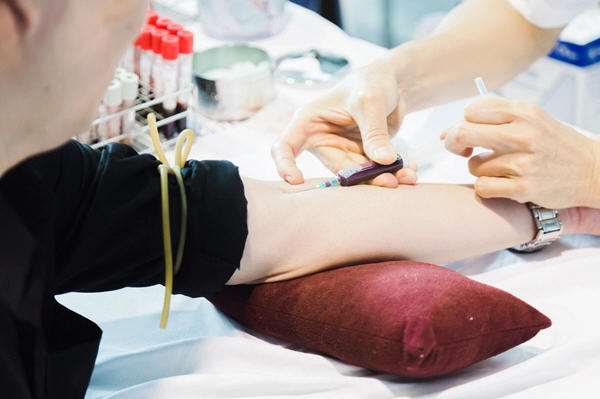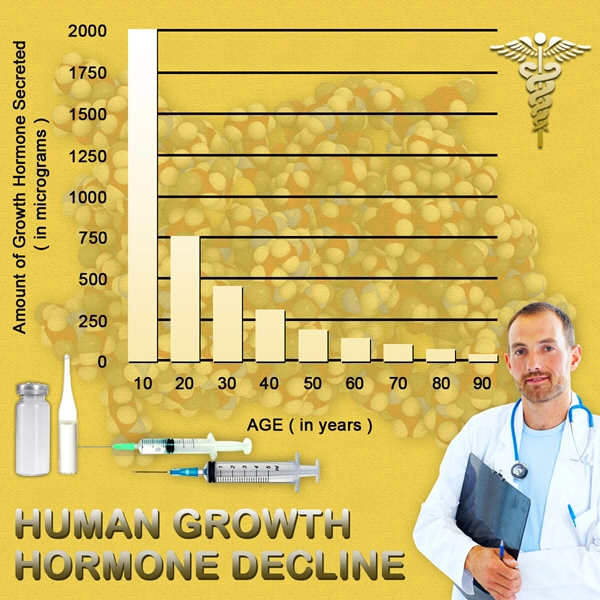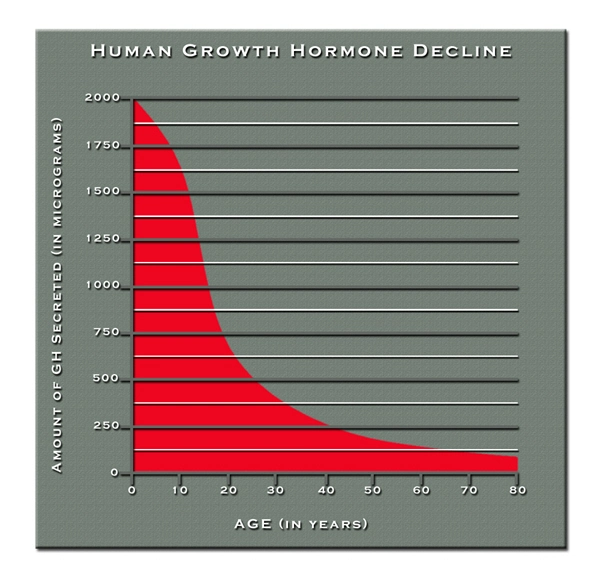
Hormone Therapy After a Hysterectomy: Human Growth Hormone
The use of hormone replacement therapies (HRT) has increased over the past few decades.
From helping children to grow and develop normally to decreasing the symptoms of AIDs patients to improving the lives of patients suffering from adult-onset hormone deficiency, the list has been steadily getting longer.
Another way that HRT can benefit mankind (more like womankind) is by helping women who have gotten a hysterectomy. A fairly standard procedure, hysterectomies are used to treat issues with the uterus resulting in changes to the female reproductive system and associated hormones.
What is a Hysterectomy?
A hysterectomy is a surgical procedure defined as removing the uterus. Still, other organs or tissues (ovaries or fallopian tubes) may be removed simultaneously, depending on the reason for the surgery.
The main repercussions of this surgery are the cessation of menstruation and the ability to carry children. A total hysterectomy is the removal of the uterus and cervix. Depending on how many tissues are removed determines the effect on the endocrine system (hormones). The different types of hysterectomies are:
- Total Hysterectomy: the entire uterus and cervix are removed
- Supracervical (subtotal or partial) Hysterectomy: The upper part of the uterus is removed, but the cervix is left alone
- Radical Hysterectomy: A total hysterectomy, but it also includes removing other structures or tissues surrounding the uterus.
Other structures or tissues that may be removed include the ovaries or fallopian tubes, significantly if they are affected by endometriosis or cancer (salpingo-oophorectomy if both are removed, salpingectomy if fallopian tubes removed, oophorectomy if ovaries removed).
A woman may undergo this procedure for reasons such as abnormal bleeding, prolapse of the uterus, endometriosis, chronic pelvic pain, or cancer. Therefore, it is a standard procedure for women in the United States.
Unfortunately, the procedure can cause hormonal imbalance and immediate menopause (also called surgical menopause) if the ovaries are removed. In addition, women may be at an increased risk for osteoporosis. For these reasons, a woman may be prescribed hormone therapy to relieve the symptoms of menopause and possibly reduce the risk of osteoporosis.
 Hormones After Hysterectomy
Hormones After Hysterectomy
Even if just the uterus is removed, hormone imbalance can still occur. It used to be theorized that since the uterus doesn't produce hormones, like the ovaries, its removal would not produce an imbalance – but that doesn't seem to be the case.
Both the ovaries and the uterus share a blood supply, and when the uterus is removed, the functioning of the ovaries may be adversely affected.
If the ovaries are removed along with the uterus, then you can definitely expect a major hormonal shift with both estrogen and progesterone. Essentially, a woman will enter menopause. This is especially troublesome and life-altering for a woman who had to have a hysterectomy at a young age, such as in her twenties or thirties.
Thankfully, we can quickly treat these hormonal issues post-surgery with modern medicine. Sometimes, a hysterectomy can even be avoided with HRT depending on the issue, such as with endometriosis or uterine fibroids.
HRT and Hysterectomy
A sudden drop in human growth hormone (HGH) triggers the decline in estrogen and progesterone. The drop in these female hormones causes hot flashes, vaginal dryness, low libido, insomnia, and night sweats – the worst effects of menopause.
Going on an HGH replacement therapy program gives the same kind of relief to post-surgery women as it does to menopausal women. Since low growth hormone levels can lead to low estrogen and progesterone levels, it is recommended that a woman take HGH injections alongside her estrogen and progesterone replacement therapy program.
The result of using all of these hormone therapies will normalize all three, and the night sweats and low libido symptoms will decrease, as will low bone density. HGH significantly impacts bone density, and women who have gone through menopause are at an increased risk of low bone density and osteoporosis.
HGH will help to revert or prevent this. Just using estrogen/progesterone therapies will not give women the benefit of osteoporosis prevention.
The Importance of Estrogen
Estrogen is essential for women and the female reproductive system – akin to testosterone for men – being a sex hormone. As stated previously, the ovaries primarily produce estrogen, but the adrenal glands and fat tissues also produce small amounts.
This hormone affects the bones, the brain, the skin, the heart, and blood vessels – and the list goes on. A sudden drop in this hormone has a massive effect on the functioning of the female body and mental health. It is essential to be aware of this and treat this post-hysterectomy.
One of these significant effects is bone loss which leads to osteoporosis. This is why we always hear about the perils of osteoporosis for postmenopausal women.
Caucasian women are the most at risk for this disease, although men can develop the disease as well. Twenty percent of Caucasian women over the age of 50 are estimated to have osteoporosis.
Some women can lose up to 20% of their bone density within the 5-7 years following menopause! Osteoporosis literally means porous bone and is a disease in which the density and quality of the bones are reduced – any bone in the body.
Usually, the first symptom is a fracture, typically after a fall. The bones are living tissue and are constantly dissolving and reforming. Osteoporosis shows its ugly head when the dissolution process happens faster than the reformation.
A list of effects due to estrogen imbalance:
- irregular or no menstruation
- severe menopausal symptoms
- hot flashes
- night sweats
- hip, thigh, and waist fat gain
- vaginal dryness and atrophy
- mood changes, such as depression
- lumps in the breast or uterus (usually non-cancerous)
- fatigue
- low libido
- anxiety
- dry skin
Osteoporosis is triggered in most older women by the drop in estrogen following menopause. This is why it is essential to consider hormone replacement therapy, especially following a hysterectomy when the hormone drop is sudden and abrupt. The effects can be very detrimental.
 HGH Replacement Therapy for Menopause or Surgical Menopause
HGH Replacement Therapy for Menopause or Surgical Menopause
It is possible that undergoing HGH replacement therapy may be enough for a woman to combat the symptoms of menopause after a hysterectomy, as HGH deficiency symptoms are very similar to menopause symptoms.
Researchers have found growth hormone HRT to be just as effective as estrogen replacement therapy (the standard treatment), and most physicians say it is also safer than the latter.
There have been some concerns lately regarding estrogen replacement therapy (ERT), such as using ERT alone can increase the risk of uterine cancer. Because of this, doctors also prescribe progestin in addition to ERT.
A large study conducted by the National Heart, Lung, and Blood Institute of the National Institutes of Health (NIH) in 1991 was concluded early due to increased risk for some medical problems and the fact that hormone replacement did not prevent heart disease.
The study examined an estrogen-plus-progestin survey and an estrogen-alone study of women without a uterus (hysterectomy). It is somewhat concerning that the study had to be stopped early due to health concerns.
Perhaps just using growth hormone HRT is an even safer option? HGH naturally increases the levels of estrogen and progesterone in the female body, and levels are less likely to be too high when increased naturally, maintaining hormonal homeostasis.
Human growth hormone is a very easy hormone to regulate and control when under a physician-monitored program. Other options are available that make growth hormone HRT even more “natural” – sermorelin acetate.
Sermorelin acetate is a laboratory-derived copy of growth hormone-releasing hormone which is the hormone that stimulates the release of growth hormone. Using sermorelin acetate allows for the natural release of growth hormone in the bloodstream and natural regulation by the somatostatins (hormones that stimulate the cessation of growth hormone when its levels are detected to be too high in the bloodstream).
The body is brilliant and regulates all of this for us! Sometimes it just needs a little help.
The benefits of growth hormone HRT after a hysterectomy includes:
- increased bone density
- lowered risk of colorectal cancer
- better sleep
- increased sex drive and vaginal lubrication
- reduced night sweats and hot flashes
- decreased risk of heart attacks and breast cancer
In addition, estrogens are involved in body fat distribution, with a more significant fat accumulation occurring in the gluteofemoral region. Fun fact: this is why men have less cellulite and fat, on average, than women do.
It has been noted that feminized men, or men who produce too much estrogen, have more body fat than men with normal estrogen levels. These men are great candidates for testosterone replacement therapy to keep estrogen under control.
Once women go through menopause, whether regular or surgical, they accumulate more visceral fat. Undergoing growth hormone HRT this can be prevented.
One of the fantastic benefits of growth hormone replacement therapy is the swift weight loss reported by patients, especially in the belly and thigh areas.
What is Human Growth Hormone (HGH)?
All this mention of HGH and the unique hormone has not been adequately defined yet. HGH, or somatotropin, is a peptide hormone that is vital for human development during the growing years. It is also crucial for cellular maintenance and regeneration in adults.
Growth hormone is produced by the pituitary gland, where it is then released to all the different tissues around the body.
Low growth hormone levels have been linked to decreased bone mass and increased incidence of osteoporosis in 1 in 5 women.
Along with this, low growth hormone levels are also associated with a loss of lean body mass, increased stomach fat, sleeping issues such as insomnia, low libido, poor skin, and chronic fatigue. Sounds very similar to menopause, right?
Not only does a growth hormone deficiency lead to similar symptoms of menopause, but the hormone is also intricately linked with the other female hormones – estrogen and progesterone – and this is why human growth hormone replacement therapy may be an excellent option for many women who are looking to restore hormone balance after a hysterectomy.
There is no reason why it cannot be combined with the standard treatments of ERT and progesterone – or even replace them altogether, given the potential risks associated with ERT that have come to light in recent years.
If you have recently had a hysterectomy or are planning on having one, it is a good idea to research the different HRT options and discuss them with your doctor.
Some doctors only recommend estrogen and progestin therapy programs even though human growth hormone, testosterone, progesterone, black cohosh, and vitamin D/calcium therapies are also available for treating hormone imbalance post-hysterectomy.
 Once all options have been discussed with a professional, the first step is getting your hormone levels checked.
Once all options have been discussed with a professional, the first step is getting your hormone levels checked.
It is imperative to get a baseline of the concentration of growth hormone in the blood.
This is very easy to do! We send our patients to their local Quest Diagnostics or LabCorp for a comprehensive blood panel.
This panel looks at many different hormones and biochemicals to get an overall picture of your hormone status.
Once this is done, the results are sent to your endocrinologist, who can best determine which path is right for you: HRT, ERT, homeopathic, or testosterone.
If you want to discuss these other options with an endocrinologist (or hormone specialist), please call the telephone number on this webpage or send us a message using our contact form.
Our hormone specialists will contact you to discuss any questions or concerns you may have and help you decide.
Consultation with us is free, and we are here to answer any questions you may have. We know that endocrinology and medicine can be daunting to understand for many – that is what our specialists are here for!

- Why you need a blood test before you get Hormone Replacement Therapy protocols of HGH, Testosterone or Sermorelin injections [Last Updated On: August 21st, 2025] [Originally Added On: January 10th, 2020]
- How the Liver Influences Weight Gain and Affects Hormone Balance [Last Updated On: November 3rd, 2025] [Originally Added On: January 16th, 2021]
- HGH and Bodybuilding [Last Updated On: November 1st, 2025] [Originally Added On: January 20th, 2021]
- Ten HGH Frequently Asked Questions [Last Updated On: November 2nd, 2025] [Originally Added On: January 29th, 2021]
- Why You Need HGH -- Six Key Reasons [Last Updated On: October 31st, 2025] [Originally Added On: February 9th, 2021]
- Mark Cuban: The HGH Revolution is Underway [Last Updated On: October 30th, 2025] [Originally Added On: February 10th, 2021]
- Why Are So Many Celebrities Taking HGH? Do They Need It? [Last Updated On: May 25th, 2025] [Originally Added On: February 14th, 2021]
- Fitness and Beauty: The Two Go Hand-in-Hand [Last Updated On: August 18th, 2025] [Originally Added On: February 22nd, 2021]
- COVID-19 Global Pandemic: Boosting Your Immune Defense with Growth Hormone [Last Updated On: August 22nd, 2025] [Originally Added On: February 24th, 2021]
- Growth Hormone Leads to Liver Regeneration and helps support healing post surgery. [Last Updated On: September 5th, 2025] [Originally Added On: March 5th, 2021]
- HGH Injections May Improve ACL Surgery Outcomes [Last Updated On: October 29th, 2025] [Originally Added On: March 7th, 2021]
- Five Simple Ways to Naturally Increase HGH Levels [Last Updated On: May 19th, 2025] [Originally Added On: March 9th, 2021]
- Buying HGH Scams Versus Buying Real Injectable HGH [Last Updated On: February 19th, 2025] [Originally Added On: April 26th, 2021]
- How Growth Hormone (HGH) and Leptin Affect Weight Loss and Dieting [Last Updated On: October 27th, 2025] [Originally Added On: April 30th, 2021]
- How Human Growth Hormone Supports Beauty and Youthfulness [Last Updated On: October 28th, 2025] [Originally Added On: May 7th, 2021]
- HGH and Testosterone Comprehensive Hormone Therapy [Last Updated On: October 25th, 2025] [Originally Added On: May 12th, 2021]
- Growth Hormone Deficiency, the Immune System and COVID-19 [Last Updated On: September 4th, 2025] [Originally Added On: May 22nd, 2021]
- It’s Not Just Anecdotal: Science Says Growth Hormone Creates Faster and Leaner Athletes [Last Updated On: May 8th, 2025] [Originally Added On: June 18th, 2021]
- Women: 15 Warning Signs Your HGH Might Be Low [Last Updated On: May 9th, 2025] [Originally Added On: August 19th, 2021]
- HGH Doctors [Last Updated On: October 26th, 2025] [Originally Added On: September 17th, 2021]
- Beware the HGH Ripoff Artists [Last Updated On: May 7th, 2025] [Originally Added On: September 27th, 2021]
- HGH and Fertility in Women [Last Updated On: March 24th, 2025] [Originally Added On: October 7th, 2021]
- Human Growth Hormone Is Something You Absolutely Need [Last Updated On: May 6th, 2025] [Originally Added On: October 20th, 2021]
- Focus on These Five Workouts to Naturally Boost Both HGH and Testosterone [Last Updated On: April 6th, 2025] [Originally Added On: March 16th, 2022]
- We Were Ripped Off – Twice! – by HGH Scammers [Last Updated On: April 13th, 2025] [Originally Added On: June 9th, 2022]
- Which is Better? Suffering or Balancing Your Hormones for True Vitality? [Last Updated On: April 21st, 2025] [Originally Added On: September 7th, 2022]
- Tennis Game Over? Not at All! [Last Updated On: March 20th, 2025] [Originally Added On: January 18th, 2023]
- HGH and Sexual Relationships [Last Updated On: February 18th, 2025] [Originally Added On: February 1st, 2023]
- Danger: Masculinizing Effects in Women – and Feminizing Effects in Men – Can Happen if You Use Questionable HRT Sources [Last Updated On: May 5th, 2025] [Originally Added On: February 10th, 2023]
- “If You’re Not Horny, You’re Not Healthy.” [Last Updated On: March 18th, 2025] [Originally Added On: March 1st, 2023]
- An Actor’s Story – HGH Testimonial [Last Updated On: February 20th, 2025] [Originally Added On: April 6th, 2023]
- The Science behind Norditropin: How It Stimulates Growth [Last Updated On: August 14th, 2025] [Originally Added On: November 23rd, 2023]
- An Intriguing Journey: An Actor’s Experience with HGH Deficiency [Last Updated On: November 6th, 2025] [Originally Added On: February 8th, 2025]



List of USA state clinics - click a flag below for blood testing clinics.
Word Count: 1951


















































